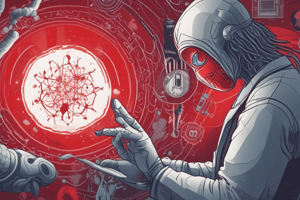Podcast
Questions and Answers
Which of the following is NOT a factor affecting the potential of an organism to produce disease?
Which of the following is NOT a factor affecting the potential of an organism to produce disease?
- Competence of immune system
- Number of organisms
- Duration of contact (correct)
- Virulence
Which of the following is NOT a stage of infection?
Which of the following is NOT a stage of infection?
- Incubation
- Primary
- Latent
- Transmission (correct)
Which of the following is NOT a mode of transmission for pathogens?
Which of the following is NOT a mode of transmission for pathogens?
- Airborne
- Droplet
- Exogenous (correct)
- Contact
Which of the following is NOT a reservoir for pathogens?
Which of the following is NOT a reservoir for pathogens?
Which of the following is NOT a portal of entry for pathogens?
Which of the following is NOT a portal of entry for pathogens?
Which of the following is NOT a healthcare acquired infection (HAI)?
Which of the following is NOT a healthcare acquired infection (HAI)?
Which of the following is the #1 prevention for healthcare acquired infections (HAI)?
Which of the following is the #1 prevention for healthcare acquired infections (HAI)?
Which of the following is NOT a stage in the chain of infection?
Which of the following is NOT a stage in the chain of infection?
Which of the following is the smallest pathogen?
Which of the following is the smallest pathogen?
Which of the following is NOT a mode of transmission for pathogens?
Which of the following is NOT a mode of transmission for pathogens?
Flashcards are hidden until you start studying
Study Notes
Factors Affecting Disease Potential
- Virulence, infectivity, and pathogenicity are factors that affect an organism's potential to produce disease.
- Host factors, such as age, immune status, and underlying health conditions, also impact an organism's potential to produce disease.
Stages of Infection
- The stages of infection are: exposure, infection, colonization, disease, and transmission.
Modes of Transmission
- Modes of transmission for pathogens include: direct contact, indirect contact, airborne, and vector-borne transmission.
- Vertical transmission, from mother to child, is also a mode of transmission.
Reservoirs for Pathogens
- Reservoirs for pathogens include: humans, animals, environment, and fomites.
Portals of Entry for Pathogens
- Portals of entry for pathogens include: skin, mucous membranes, respiratory tract, gastrointestinal tract, and genitourinary tract.
Healthcare Acquired Infections (HAI)
- Healthcare acquired infections (HAI) are infections that patients acquire during the course of receiving healthcare.
- Examples of HAI include: surgical site infections, urinary tract infections, and pneumonia.
Prevention of Healthcare Acquired Infections (HAI)
- Hand hygiene is the #1 prevention for healthcare acquired infections (HAI).
Chain of Infection
- The chain of infection consists of: infectious agent, reservoir, portal of exit, mode of transmission, portal of entry, and susceptible host.
Types of Pathogens
- Prions are the smallest pathogens, consisting of abnormally folded proteins.
- Other types of pathogens include: bacteria, viruses, fungi, and parasites.
Studying That Suits You
Use AI to generate personalized quizzes and flashcards to suit your learning preferences.



